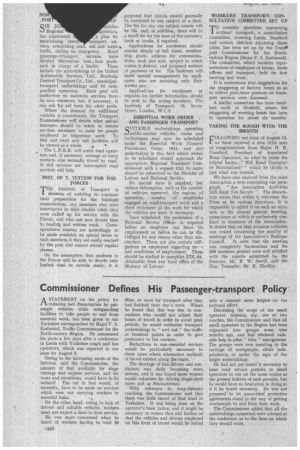Commissioner Defines His Passenger 7 transport Policy A STATEMENT on his policy for
Page 24

If you've noticed an error in this article please click here to report it so we can fix it.
reducing fuel eonsumption by passenger vehicles while safeguarding facilities to take people to and from essential work, has been given to our Yorkshire correspondent by Major' F. S. Eastwood, Traffic Commissioner for the North-eastern 'Region. He announced his plans a few day's after a conference in Leeds with Yorkshire coach and bus operators, which was reported in our issue for August 8.
Owing to the increasing needs of the Services, said the Commissioner, the amount of fuel available for stage carriage and express services, and for tours and excursions, would have to be reduced, The cut in fuel would, of necessity, have to be made on services which were not carrying workers to essential tasks.
On the other hand, owing. to lack of drivers and suitable vehicles, workers must not expect a door-to-door service.
He was more concerned when he heard of workers having to wait 30
thins. or more for transport after they had finished their day's work. Where he found that this was due to nonworkers who would not adjust their hours of travel in order to avoid peak periods, he would authorize transport undertakings to "sort out" the traffic at terminal points in order tb give preference to the workers.
Reductions in non-essential services would be particularly necessary in those cases where alternative methods
of travel existed along the rcaite. .
The shortage of bus drivers and conductors was daily becoming more serious, and it was hoped more women would volunteer for driving single-deck buses and as Conductresses.
With reference to long-distance coaching, the Commissioner said that there was little travel of that kind in Yorkshire. It wah being done on the operator's basic ration, and it might be necessary to reduce that still further so' that the vehicles and drivers employed on this form of travel would be forced into a channel more helpful ao the national effort.
Discussing the scope of the small operator, running, say, one or two coaches, the Commissioner said that all small operators in the Region had been organizedinto groups some nine months ago, and had rendered valuable help in after-" blitz " emergencies: The groups were now assisting in the carriage of workpeople, either independently or under the mgis of the larger undertakings.
Ile had not yet found it necessAry to issue road service permits -to small operators to run on the same routes as the present holders of such permits, but he would have no hesitation in doing so if it be found necessary. He was not prepared 'to let -peace-time protective agreements stand in the way of getting workpeople to and from their work.
The Commissioner added that all the undertakings concerned were advised at the conference as to. the lines on which they should work.




























































